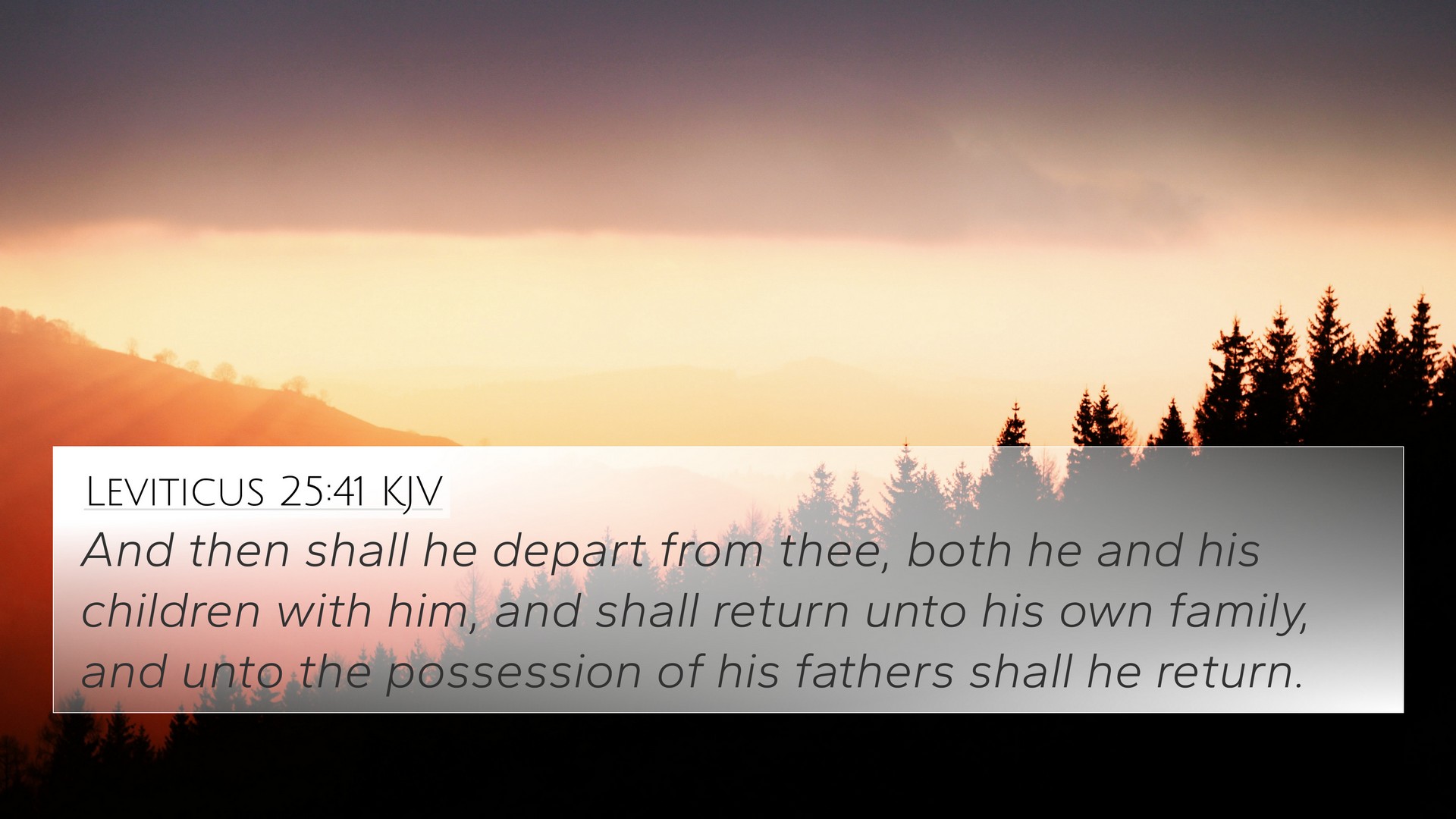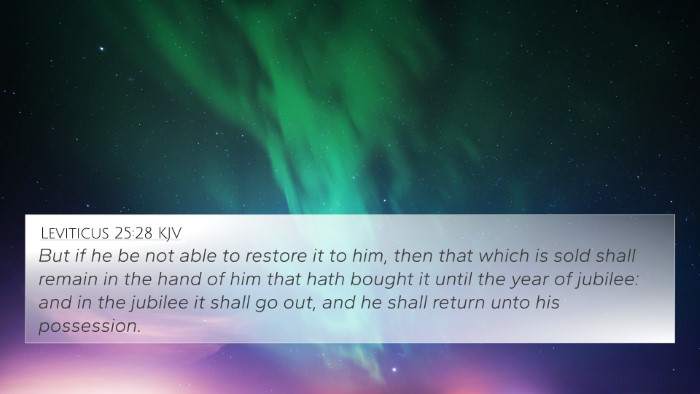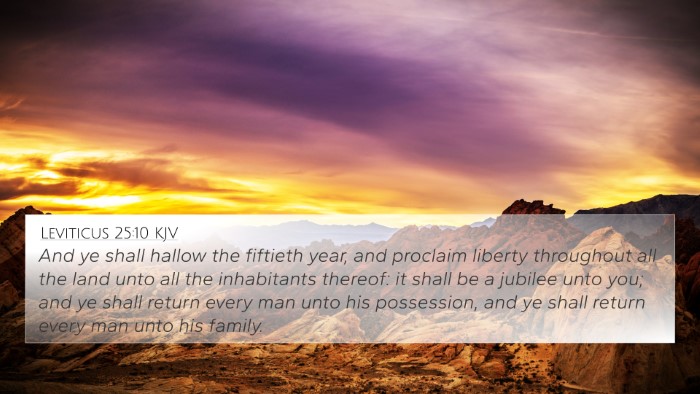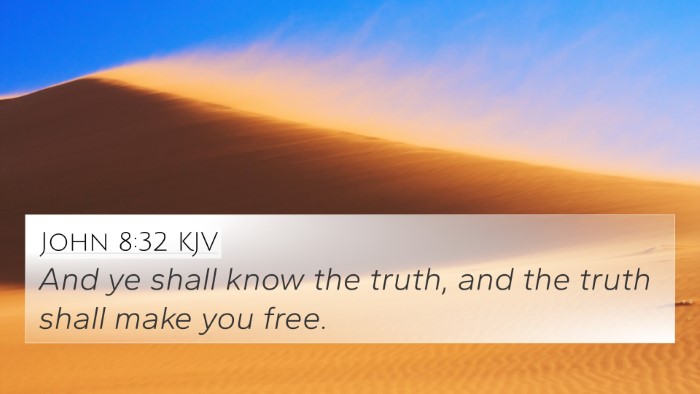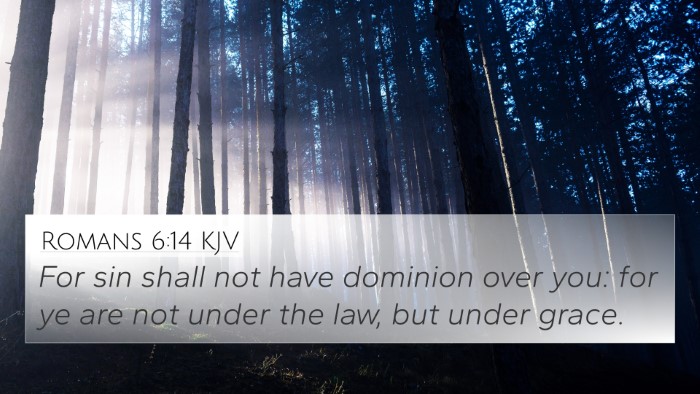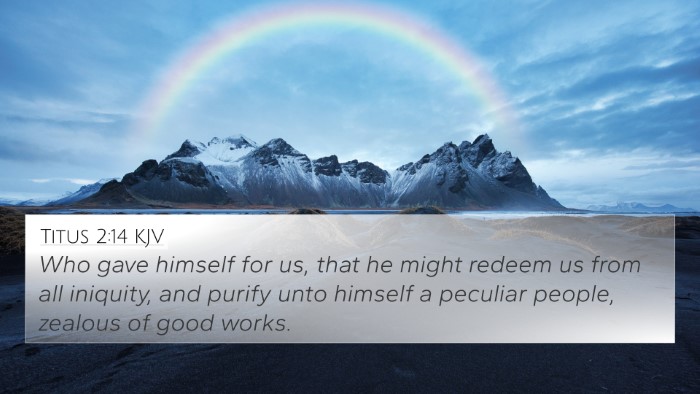Understanding Leviticus 25:41
Leviticus 25:41 states:
“And then shall he depart from thee, both he and his children with him, and shall return unto his own family, and unto the possession of his fathers shall he return.”
Summary of Meaning
This verse is situated within the context of the laws regarding the Jubilee year, a significant time of restoration and freedom for the Israelites. The essence of Leviticus 25:41 revolves around the theme of returning to one’s own heritage, illustrating God's intent for His people to maintain their identity and rights.
Contextual Analysis
Leviticus 25:41 calls attention to God's provision for the marginalized and disenfranchised within the Israelite community. It emphasizes the return to family and ancestral land, highlighting concepts of freedom, restoration, and social justice.
Insights from Matthew Henry
Matthew Henry elaborates that the departure of the servitude signifies not only physical freedom but also spiritual renewal. It is a reminder that God desires His people to be free from bondage and to embrace their familial identities as He intended.
Albert Barnes’ Commentary
Albert Barnes emphasizes the social implications of this verse, noting that it offers a framework for societal balance. Barnes notes the importance of periodic resets to prevent economic disparity and ensure that Israelites could return to their rightful inheritance, which reflects God's justice.
Adam Clarke’s Perspective
Adam Clarke highlights that this passage underscores the concept of each Israelite having their part in the land—a form of God’s promise to sustain the covenant community. Clarke asserts that the verse serves as an assurance that the Israelites will never lose their identity or inheritance, even in times of adversity.
Cross-Reference Analysis
Understanding the connections within Scripture deepens our comprehension of Leviticus 25:41. Below are several verses that relate to this theme of restoration, identity, and return:
- Exodus 21:2: Discusses the release of Hebrew servants after six years, mirroring the theme of restoration.
- Deuteronomy 15:12: Similar to Exodus, it emphasizes the release of servants and the importance of familial bonds.
- Jeremiah 30:3: A promise of restoration of Israel and Judah, reflecting God's enduring covenant.
- Ezekiel 34:11-12: Indicates God's intention to gather His people, akin to returning to their own.
- Isaiah 61:1: This prophetic verse speaks about liberty and restoration, echoing the Jubilee theme.
- Luke 4:18: Jesus quotes Isaiah in proclaiming the good news to the poor, emphasizing freedom for the captives.
- Galatians 4:26: Speaking of the heavenly Jerusalem as the mother of us all, the theme of belonging is reinforced.
- Romans 8:21: The creation itself will be liberated, pointing to a final restoration, akin to the Jubilee's intent.
Connections Between Bible Verses
Leviticus 25:41 provides rich connections that can enhance our understanding of other biblical texts:
- Spiritual Redemption: The act of departing and returning can be likened to the themes of redemption seen in books like Ruth, where the principle of redemption (goel) is evident.
- Enduring Promises: The promise of land as seen in Leviticus aligns with references in the New Testament that affirm believers' inheritance (Ephesians 1:14).
- Deliverance: The repetitive motifs of deliverance found in both Exodus and Leviticus resonate with the ultimate deliverance promised through Christ.
Study Methods for Cross-Referencing
Utilizing cross-references helps uncover the depth of biblical texts. Here are some tools and methods:
- Bible Concordance: An indispensable tool for locating related scriptures.
- Bible Cross-Reference Guide: Offers systematic ways to find analogous themes.
- Cross-Reference Bible Study: Engaging in thematic studies to explore links between verses.
- Bible Reference Resources: Leveraging resources like commentaries to see connections.
- Identifying Connections Between Old and New Testament: Making thematic and contextual links to deepen understanding.
Conclusion
Ultimately, Leviticus 25:41 serves as an indelible reminder of God’s faithfulness in restoring His people to their rightful places within the community of faith. This verse invites believers to reflect on the significance of their heritage and the importance of returning to spiritual roots, illustrating profound truths rooted in the fabric of God’s redemptive plan throughout Scripture.
